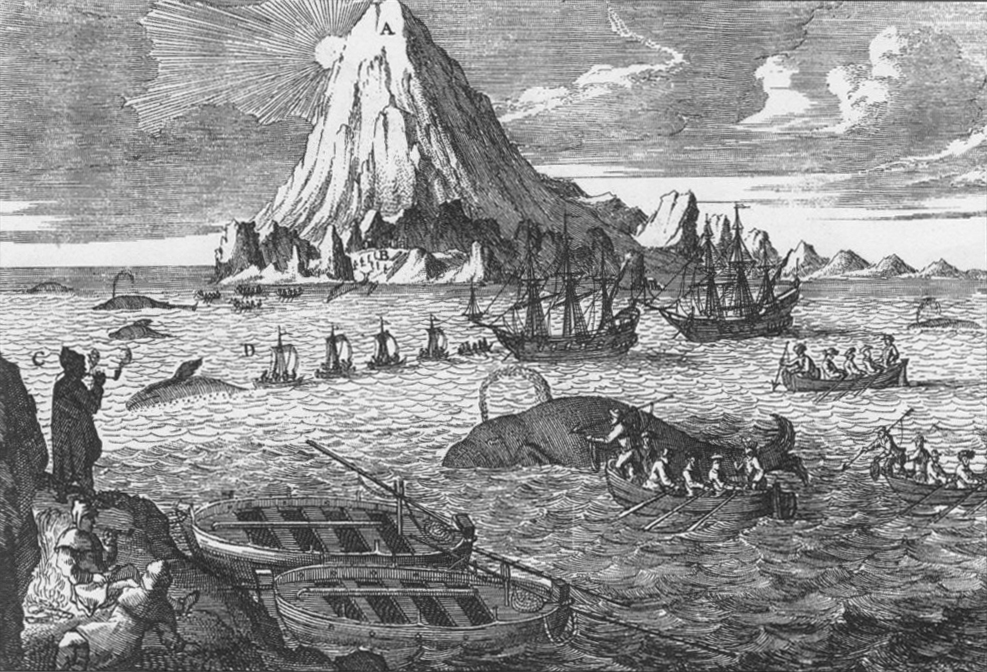|
Railsea
''Railsea'' is a young adult novel written and illustrated by English writer China Miéville, and published in May 2012. Miéville described the novel as "weird fiction", ''io9'' labelled its mix of fantasy and steampunk elements as "salvagepunk" and the story has been seen as an "affectionate parody" of Herman Melville's classic 1851 novel ''Moby-Dick'', also drawing on Robert Louis Stevenson's adventure novels ''Treasure Island'' and ''Kidnapped''. Setting ''Railsea'' is set on a dystopian world whose lands are covered by endless interconnecting tracks of rails, known as the "railsea". The earth is colonised by ravenous giant naked mole-rats and other carnivorous giant forms of familiar animals, such as earwigs and antlions as well as stranger non-identifiable creatures that reside in the polluted sky. These threats mean that humanity are confined to 'islands' of harder rock through which the animals cannot burrow and the spaces between can only be safely traversed by use of tr ... [...More Info...] [...Related Items...] OR: [Wikipedia] [Google] [Baidu] |
China Miéville
China Tom Miéville ( ; born 6 September 1972) is a British speculative fiction writer and Literary criticism, literary critic. He often describes his work as ''weird fiction'' and is allied to the loosely associated movement of writers called ''New Weird''. Miéville has won numerous awards for his fiction, including the Arthur C. Clarke Award, British Fantasy Award, BSFA Award, Hugo Award, Locus Award and World Fantasy Awards. He holds the record for the most Arthur C Clarke Award wins (three). His novel ''Perdido Street Station'' was ranked by ''Locus (magazine), Locus'' as the 6th all-time best fantasy novel published in the 20th century. During 2012–13, he was writer-in-residence at Roosevelt University in Chicago. He became a Fellow of the Royal Society of Literature in 2015. Miéville is active in anti-capitalist politics in the United Kingdom and has previously been a member of the International Socialist Organization (US) and the short-lived International Socialist ... [...More Info...] [...Related Items...] OR: [Wikipedia] [Google] [Baidu] |
Whaling
Whaling is the process of hunting of whales for their usable products such as meat and blubber, which can be turned into a type of oil that became increasingly important in the Industrial Revolution. It was practiced as an organized industry as early as 875 AD. By the 16th century, it had risen to be the principal industry in the Basque coastal regions of Spain and France. The industry spread throughout the world, and became increasingly profitable in terms of trade and resources. Some regions of the world's oceans, along the animals' migration routes, had a particularly dense whale population, and became the targets for large concentrations of whaling ships, and the industry continued to grow well into the 20th century. The depletion of some whale species to near extinction led to the banning of whaling in many countries by 1969, and to an international cessation of whaling as an industry in the late 1980s. The earliest known forms of whaling date to at least 3000 BC. Coastal ... [...More Info...] [...Related Items...] OR: [Wikipedia] [Google] [Baidu] |
British Steampunk Novels
British may refer to: Peoples, culture, and language * British people, nationals or natives of the United Kingdom, British Overseas Territories, and Crown Dependencies. ** Britishness, the British identity and common culture * British English, the English language as spoken and written in the United Kingdom or, more broadly, throughout the British Isles * Celtic Britons, an ancient ethno-linguistic group * Brittonic languages, a branch of the Insular Celtic language family (formerly called British) ** Common Brittonic, an ancient language Other uses *''Brit(ish)'', a 2018 memoir by Afua Hirsch *People or things associated with: ** Great Britain, an island ** United Kingdom, a sovereign state ** Kingdom of Great Britain (1707–1800) ** United Kingdom of Great Britain and Ireland (1801–1922) See also * Terminology of the British Isles * Alternative names for the British * English (other) * Britannic (other) * British Isles * Brit (other) * Brito ... [...More Info...] [...Related Items...] OR: [Wikipedia] [Google] [Baidu] |
British Children's Novels
British may refer to: Peoples, culture, and language * British people, nationals or natives of the United Kingdom, British Overseas Territories, and Crown Dependencies. ** Britishness, the British identity and common culture * British English, the English language as spoken and written in the United Kingdom or, more broadly, throughout the British Isles * Celtic Britons, an ancient ethno-linguistic group * Brittonic languages, a branch of the Insular Celtic language family (formerly called British) ** Common Brittonic, an ancient language Other uses *'' Brit(ish)'', a 2018 memoir by Afua Hirsch *People or things associated with: ** Great Britain, an island ** United Kingdom, a sovereign state ** Kingdom of Great Britain (1707–1800) ** United Kingdom of Great Britain and Ireland (1801–1922) See also * Terminology of the British Isles * Alternative names for the British * English (other) * Britannic (other) * British Isles * Brit (other) * ... [...More Info...] [...Related Items...] OR: [Wikipedia] [Google] [Baidu] |
Novels By China Miéville
A novel is a relatively long work of narrative fiction, typically written in prose and published as a book. The present English word for a long work of prose fiction derives from the for "new", "news", or "short story of something new", itself from the la, novella, a singular noun use of the neuter plural of ''novellus'', diminutive of ''novus'', meaning "new". Some novelists, including Nathaniel Hawthorne, Herman Melville, Ann Radcliffe, John Cowper Powys, preferred the term "romance" to describe their novels. According to Margaret Doody, the novel has "a continuous and comprehensive history of about two thousand years", with its origins in the Ancient Greek and Roman novel, in Chivalric romance, and in the tradition of the Italian renaissance novella.Margaret Anne Doody''The True Story of the Novel'' New Brunswick, NJ: Rutgers University Press, 1996, rept. 1997, p. 1. Retrieved 25 April 2014. The ancient romance form was revived by Romanticism, especially the histori ... [...More Info...] [...Related Items...] OR: [Wikipedia] [Google] [Baidu] |
2012 British Novels
1 (one, unit, unity) is a number representing a single or the only entity. 1 is also a numerical digit and represents a single unit of counting or measurement. For example, a line segment of ''unit length'' is a line segment of length 1. In conventions of sign where zero is considered neither positive nor negative, 1 is the first and smallest positive integer. It is also sometimes considered the first of the infinite sequence of natural numbers, followed by 2, although by other definitions 1 is the second natural number, following 0. The fundamental mathematical property of 1 is to be a multiplicative identity, meaning that any number multiplied by 1 equals the same number. Most if not all properties of 1 can be deduced from this. In advanced mathematics, a multiplicative identity is often denoted 1, even if it is not a number. 1 is by convention not considered a prime number; this was not universally accepted until the mid-20th century. Additionally, 1 i ... [...More Info...] [...Related Items...] OR: [Wikipedia] [Google] [Baidu] |
The A
''The'' () is a grammatical article in English, denoting persons or things that are already or about to be mentioned, under discussion, implied or otherwise presumed familiar to listeners, readers, or speakers. It is the definite article in English. ''The'' is the most frequently used word in the English language; studies and analyses of texts have found it to account for seven percent of all printed English-language words. It is derived from gendered articles in Old English which combined in Middle English and now has a single form used with nouns of any gender. The word can be used with both singular and plural nouns, and with a noun that starts with any letter. This is different from many other languages, which have different forms of the definite article for different genders or numbers. Pronunciation In most dialects, "the" is pronounced as (with the voiced dental fricative followed by a schwa) when followed by a consonant sound, and as (homophone of the archaic p ... [...More Info...] [...Related Items...] OR: [Wikipedia] [Google] [Baidu] |
Metafiction
Metafiction is a form of fiction which emphasises its own narrative structure in a way that continually reminds the audience that they are reading or viewing a fictional work. Metafiction is self-conscious about language, literary form, and story-telling, and works of metafiction directly or indirectly draw attention to their status as artifacts. Metafiction is frequently used as a form of parody or a tool to undermine literary conventions and explore the relationship between literature and reality, life, and art. Although metafiction is most commonly associated with postmodern literature that developed in the mid-20th century, its use can be traced back to much earlier works of fiction, such as '' The Canterbury Tales'' ( Geoffrey Chaucer, 1387), ''Don Quixote'' (Miguel de Cervantes, 1605), ''The Life and Opinions of Tristram Shandy, Gentleman'' (Laurence Sterne, 1759), and '' Vanity Fair'' (William Makepeace Thackeray, 1847). Metafiction became particularly prominent in the 1 ... [...More Info...] [...Related Items...] OR: [Wikipedia] [Google] [Baidu] |
Far-left Politics
Far-left politics, also known as the radical left or the extreme left, are politics further to the left on the left–right political spectrum than the standard political left. The term does not have a single definition. Some scholars consider it to represent the left of social democracy, while others limit it to the left of communist parties. In certain instances, especially in the news media, ''far-left'' has been associated with some forms of authoritarianism, anarchism, and communism, or it characterizes groups that advocate for revolutionary socialism, Marxism and related communist ideologies, anti-capitalism or anti-globalization. Extremist far-left politics have motivated political violence, radicalization, genocide, terrorism, sabotage and damage to property, the formation of militant organizations, political repression, conspiracism, xenophobia, and nationalism. Far-left terrorism consists of militant or insurgent groups that attempt to realize their ideals ... [...More Info...] [...Related Items...] OR: [Wikipedia] [Google] [Baidu] |




.png)